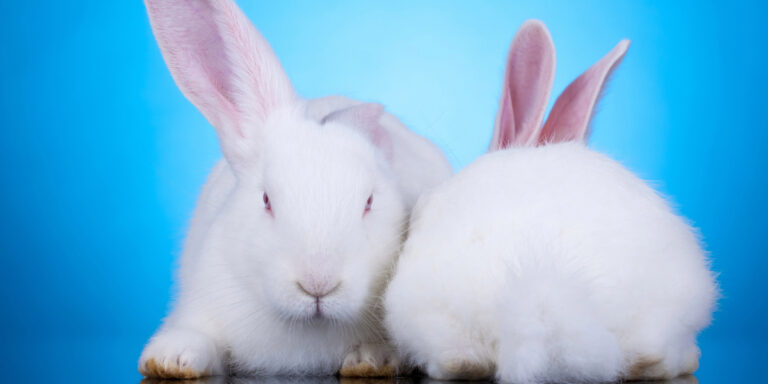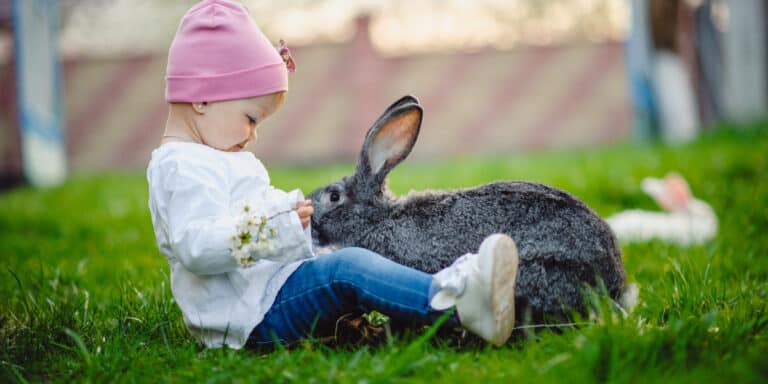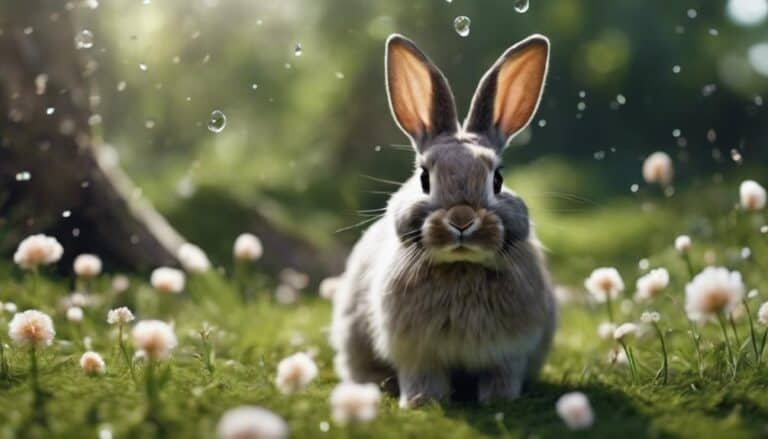When it comes to your rabbits, think of them as delicate barometers, finely tuned to their environment. But what happens when these indicators start wavering? Signs of stress in rabbits can be subtle yet impactful.
From changes in behavior to physical manifestations, recognizing these signs is important for your rabbits' well-being. So, how can you decipher these signals and guarantee your rabbits' happiness and health?
Let's explore together the nuanced world of stress in rabbits and how to navigate it effectively.
Contents
- 1 Key Takeaways
- 2 Environmental Stressors for Rabbits
- 3 Social Stressors in Pet Rabbits
- 4 Mental Stressors and Rabbits
- 5 Understanding Your Rabbit's Behavior
- 6 Implementing Daily Enrichment Activities
- 7 Seeking Veterinary Guidance for Stress Relief
- 8 Frequently Asked Questions
- 9 What Can I Do to Help Reduce Stress in My Pet Rabbit?
- 10 Conclusion
Key Takeaways
- Signs of stress in rabbits include decreased appetite, excessive grooming, hiding, and thumping behavior.
- Behavioral changes like increased digging, lethargy, and vocalization can indicate stress in rabbits.
- Understanding typical behavior patterns helps identify stress signs like aggression, self-mutilation, and changes in litter box habits.
- Providing a supportive environment, balanced diet, enrichment, and routine care can help alleviate stress in rabbits.
Environmental Stressors for Rabbits
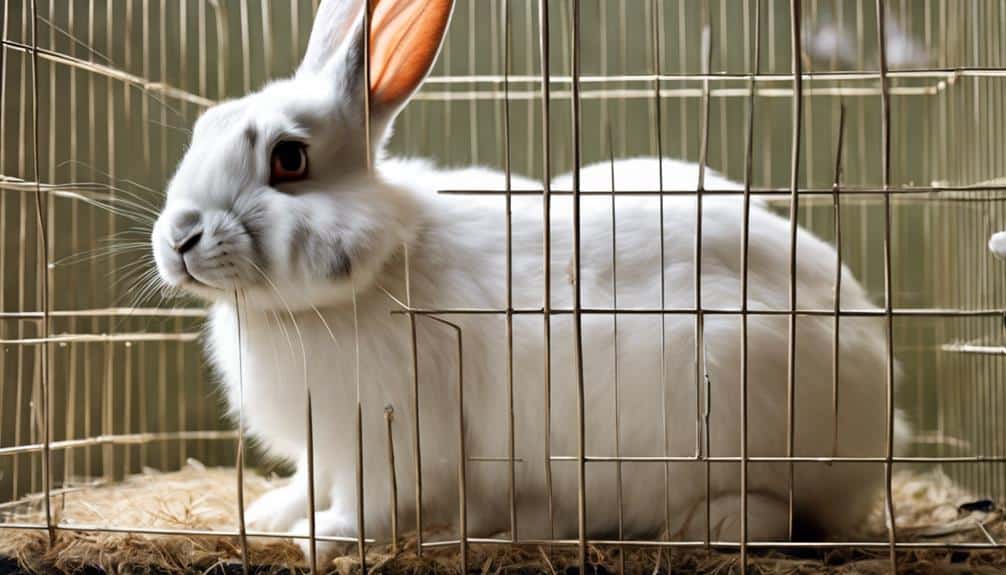
Experiencing environmental stressors can greatly impact a rabbit's well-being and overall health. One critical aspect of a rabbit's environment is the cage size. Inadequate space can lead to discomfort and restrict the rabbit's movement, causing stress. Providing a spacious living area allows rabbits to exhibit their natural behaviors, such as hopping and exploring, promoting both physical and mental well-being.
Access to food is another vital component of a rabbit's environment. Lack of proper nutrition due to insufficient food can be a severe stressor for rabbits, affecting their health. Ensuring rabbits have a constant supply of fresh hay, vegetables, and water is essential for their overall well-being and can help prevent unnecessary stress.
Maintaining a suitable environment that mimics a rabbit's natural habitat is crucial. This includes ensuring proper ventilation, adequate lighting to regulate their day-night cycle, and stable temperatures. Environmental factors like poor air quality or extreme temperatures can stress rabbits, highlighting the importance of creating a comfortable and safe living space for these sensitive animals.
Social Stressors in Pet Rabbits
In considering the well-being of your pet rabbit, it's important to recognize the impact of social stressors, which can stem from various factors such as overcrowding or changes in their social environment. Rabbits are social animals that can experience emotional turmoil from situations like the loss of a mate or the introduction of a new cage mate, disrupting their social dynamics and behavior.
Consistency in daily habits and schedules plays an important role in reducing social stress in pet rabbits and ensuring their overall well-being. Providing environmental enrichment and mental stimulation is essential to alleviating social stress in rabbits, as it helps fulfill their natural instincts and behaviors.
Understanding and respecting the natural social structures of rabbits are essential when addressing social stressors in pet rabbits. By creating a harmonious social environment and meeting their social needs, you can help your pet rabbit lead a happier and healthier life.
Mental Stressors and Rabbits
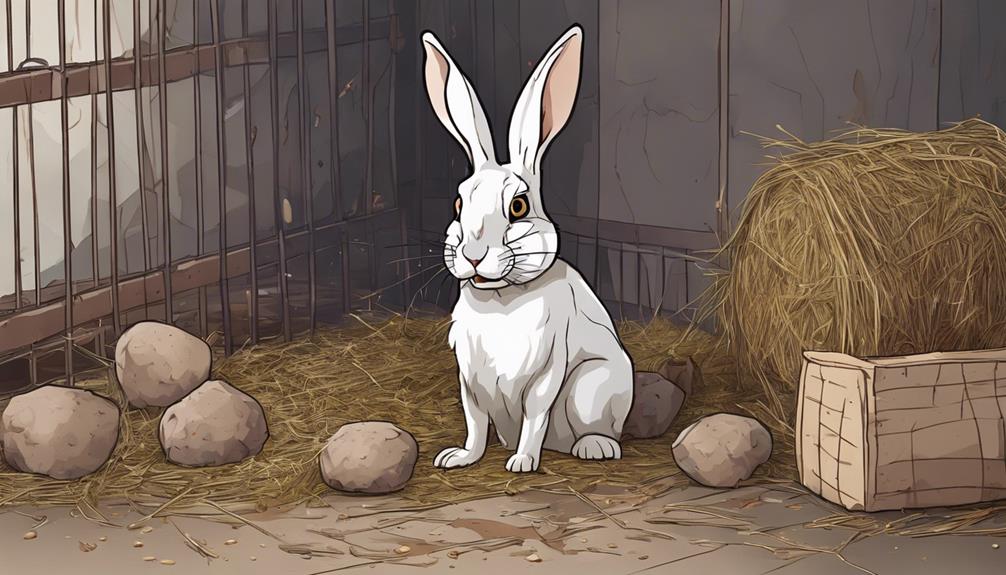
When it comes to mental stressors in rabbits, recognizing signs like changes in behavior and habits is crucial.
These changes can have a direct impact on the well-being of your furry companions.
Understanding these signs and their implications can help you address mental stress in rabbits effectively.
Signs of Mental Stress
What're some common signs that indicate mental stress in rabbits and how can it be caused by various stressors?
Mental stress in rabbits can be triggered by factors such as lack of stimulation and environmental enrichment. Here are some signs to look out for:
- Excessive grooming or chewing behaviors.
- Repetitive actions like digging or circling.
- Restlessness, overgrooming, or destructive behaviors.
When rabbits lack mental stimulation and enrichment, they can become bored and frustrated, leading to these stress indicators. To help alleviate mental stress, provide toys, tunnels, and challenges to keep your rabbits engaged and mentally stimulated. By addressing these stressors, you can promote a healthier and happier environment for your rabbits.
Behavioral Changes Observed
Mental stressors in rabbits can manifest as noticeable changes in their behavior, indicating underlying issues that need attention and care. Rabbits may show increased aggression, excessive grooming, or decreased activity levels when experiencing mental stress.
Lack of mental stimulation can lead to boredom and stress, resulting in destructive behaviors or withdrawal. Changes in a rabbit's routine or environment can trigger stress, causing them to hide or refuse interaction.
To alleviate mental stress, providing enrichment activities like toys, tunnels, or puzzle feeders is essential. Understanding a rabbit's natural behaviors and social needs is critical in preventing mental stress and promoting their overall well-being.
Impact on Health
Moving from observing behavioral changes in rabbits due to mental stress, it's important to understand how these stressors can directly impact the health of these animals.
Here are three ways mental stress can affect a rabbit's health:
- Gastrointestinal Stasis: When stressed, rabbits may experience a slowdown in their digestive system, leading to gastrointestinal stasis.
- Fur Loss: Stress can contribute to rabbits excessively grooming themselves, resulting in fur loss.
- Decreased Immune Function: Mental stress can weaken a rabbit's immune system, making them more susceptible to illnesses and infections.
These health issues can arise when rabbits are exposed to environments that cause stress, emphasizing the need for a supportive and enriching environment for their overall well-being.
Understanding Your Rabbit's Behavior
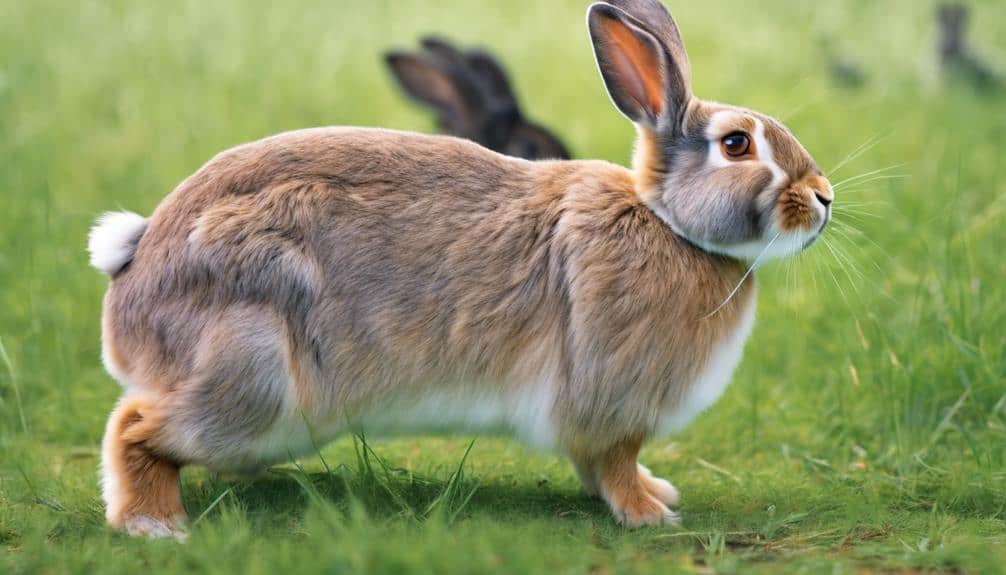
Understanding your rabbit's behavior is important in recognizing signs of stress early on. By observing how your rabbits live and explore their environment, you can better understand what's normal for them.
When rabbits are feeling stressed, they may exhibit behaviors like hunching their posture or hiding. Changes in their eating habits, grooming behaviors, or vocalizations can also signal stress. To help them stay happy and healthy, it's essential to know your rabbit's typical behavior patterns.
Pay attention to their social interactions and preferences, as these can provide insights into potential stress triggers. Regularly monitoring your rabbit's behavior and environment will enable you to spot any signs of stress promptly.
Implementing Daily Enrichment Activities
To enhance your rabbit's well-being and mental stimulation, consider incorporating daily enrichment activities into their routine. Daily enrichment activities play an important role in preventing stress and ensuring your rabbits lead happy, healthy lives. Here are some ways you can enrich your rabbit's environment:
- Provide a Variety of Toys: Offer toys such as balls, tunnels, and puzzle feeders to keep your rabbit mentally engaged and physically active throughout the day.
- Rotate Toys Regularly: Switching up toys helps prevent boredom and encourages exploration, ensuring your rabbits stay interested in their surroundings.
- Encourage Foraging Behaviors: Hide treats in hay or interactive toys to engage your rabbit's natural instincts, promoting mental stimulation and reducing stress levels.
Seeking Veterinary Guidance for Stress Relief
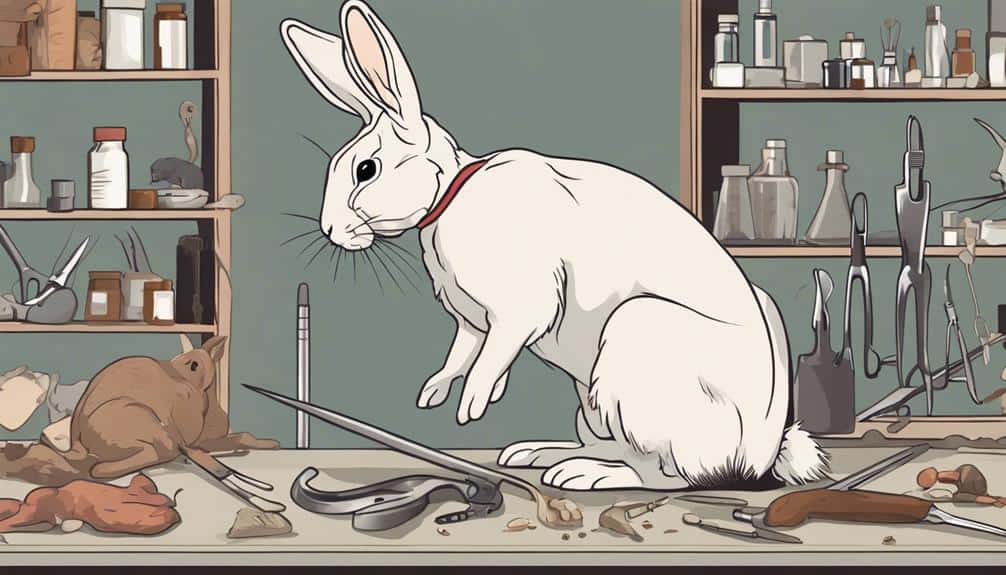
When observing signs of stress in your rabbit, consulting a veterinarian is essential for effective stress relief and maintaining your pet's well-being.
If your pet rabbit is suffering from stress, seeking veterinary guidance is critical to address the issue promptly. A veterinarian can assess your rabbit's condition, identify the underlying causes of stress, and recommend appropriate treatment or management strategies.
By seeking professional advice, you can gain valuable insights into the triggers of stress in your rabbit and implement effective solutions to guarantee its comfort and happiness. Veterinary guidance plays a significant role in promoting a happier and healthier life for your pet rabbit, as it can lead to timely interventions that alleviate stress-related issues.
Remember that your rabbit's well-being is paramount, and consulting a vet is a proactive step towards providing the necessary care and support to help your furry friend thrive.
Frequently Asked Questions
How Can I Tell if My Rabbit Is Stressed?
To tell if your rabbit is stressed, pay attention to body language and behavior changes. Look for physical symptoms like excessive grooming. Consider environmental factors and diet. Guarantee bonding and companionship for their well-being.
How Do You Treat Stress in Rabbits?
To manage stress in rabbits, focus on calming techniques and behavioral therapy. Implement environmental enrichment with secure spaces and toys. Prioritize a varied diet and social breaks. Consult a vet for any underlying health issues.
How Do Rabbits Act When Sad?
When sad, rabbits might show signs like decreased appetite, fur loss, or aggressive behavior. These behaviors indicate their emotional wellbeing and mental health. It's important to observe your rabbit's behavior closely to guarantee their happiness.
Why Is Stress Bad for Rabbits?
Stress impacts rabbit health by causing behavioral changes and long-term consequences. Chronic stress weakens immunity, leading to illnesses, digestive issues like diarrhea, and reduced appetite. It can result in weight loss, affecting overall well-being and quality of life.
What Can I Do to Help Reduce Stress in My Pet Rabbit?
It’s important to recognize the indicators of stress in rabbits and take steps to reduce it. Creating a peaceful environment, providing plenty of space to roam, offering stimulating toys, and regular exercise can all help alleviate stress in your pet rabbit.
Conclusion
So, now you know the common signs of stress in rabbits. Remember, keeping your pet rabbit happy and healthy is important.
If you notice any of these signs, don't stress yourself out too much. Just consult a veterinarian, make some small changes, and watch your fluffy friend thrive.
After all, a stressed rabbit is no fun for anyone – except maybe the cage bars they're biting on!


